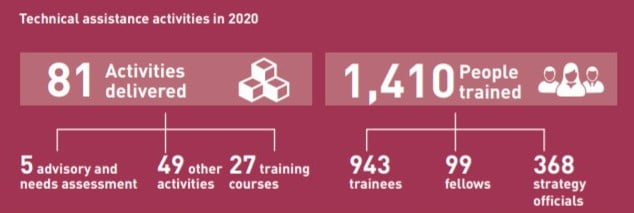IMO published the latest annual technical cooperation report publication, covering the impact of the pandemic, new ways of working, and the spirit of collaboration to continue supporting IMO Member States towards better and more effective implementation of IMO regulations.
Impact of the COVID-19 Pandemic on IMO Technical Cooperation (TC) Activities
The impact of the COVID 19 pandemic caused an overall reduction of deliverables while the world adjusted to new ways of working, including adjusting to global travel restrictions.
However, the IMO Secretariat adapted its working practices and developed new methodologies to continue to deliver TC strategic work.
Despite the challenges faced, the continued successful delivery of remote technical assistance initiatives and activities augurs well for future developments
Namely, 2020 saw the delivery of 81 TC activities, the training of 943 people worldwide and the provision of 99 fellowships in the maritime field, including a total of 22 fellows at the World Maritime University (WMU) and the International Maritime Law Institute (IMLI).
Expenditure of nearly $9 million was recorded on TC activities during 2020. That translates to a financial delivery rate of 41% of programmed resources, with funding from 27 different sources.
Sustainable Technical Cooperation
One aspect of the strategic plan requires IMO to improve the implementation of its instruments to create a level playing field for its members. For this reason, IMO continues to provide Member States and the industry with the information needed to better identify and understand barriers to implementation, and to consider ways of eliminating those barriers, including through analysis of findings from the IMO Member State Audit Scheme (IMSAS) and data from other sources.
ITCP projects and activities are a result of a consultative process between the Organization’s Technical Cooperation Committee (TCC), the thematic priorities of its other committees and its key strategic principles. We continue to develop and execute projects to provide targeted capacity-building and TC that fosters, promotes and supports implementation efforts, while continuing to pay particular attention to the needs of Small Island Developing States (SIDS) and Least Developed Countries (LDCs).

Women in the Maritime Community
Through its Women in Maritime programme, which is in its fourth decade, IMO continues its commitment to supporting its Member States attainment of the United Nations (UN) 2030 Agenda for Sustainable Development’s Sustainable Development Goal (SDG) 5 to achieve gender equality and empower all women and girls.
Since its launch in 1988, the programme has helped to create an institutional framework that incorporates a gender dimension into IMO policies and procedures. That approach has supported increased access to maritime training and employment opportunities for women in the maritime sector all over the world.
During 2020, the implementation of the Women in Maritime programme was consistent with the overall IMO
technical cooperation (TC) mission of giving priority to meeting the special assistance needs of Africa, the Least
Developed Countries (LDCs) and the Small Island Developing States (SIDS).
The overall strategy also continued to evolve by taking into consideration the ‘Empowering Women in the Maritime Community’ contributions of the World Maritime Theme for 2019, Resolution A.1147(31) on preserving the legacy of that theme, the priority conclusions of the Third World Maritime University (WMU) International Women’s Conference and a symposium held at IMO headquarters.




























































